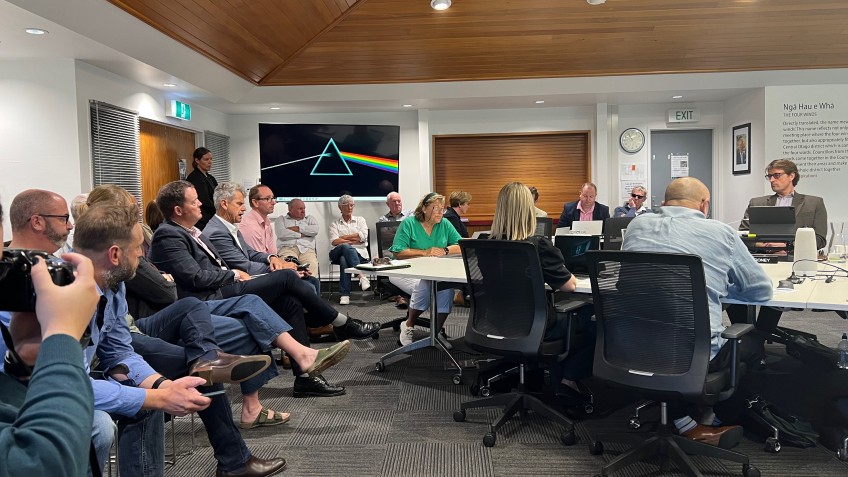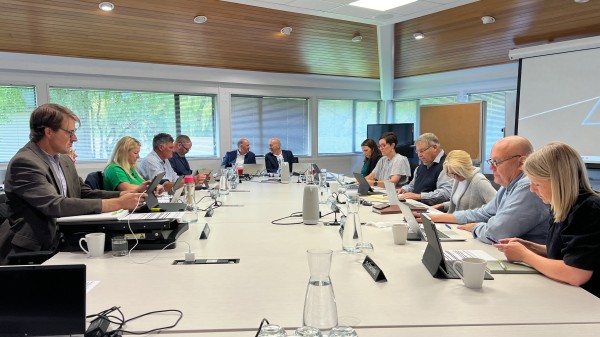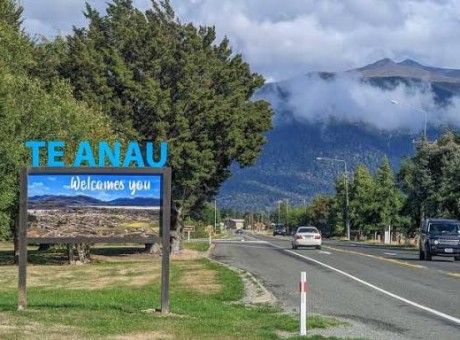Cromwell 'asset grab' deferred: claims of 'bullying' and 'belittling'

The Cromwell Community Board has retained its delegated decision making power, for now, after a lengthy and at times heated discussion at the Central Otago District Council.
The mayor and nine councillors voted in favour of deferring further discussions on the role of all four community boards in the district until after a planned consultation later this year on which council functions should sit at a district level and which should sit at a ward level.
It was a full public gallery, and all slots to speak in the proceeding public forum were snapped up, with Cromwellians attending today's Alexandra meeting en masse to voice their concerns at the proposal.

Councillors ready themselves for a lengthy, and at times heated, discussion.
Councillors Stuart Duncan and Tracy Paterson voted against the decision, with both suggesting it simply 'kicked the can down the road'.
Mr Duncan prefaced his vote by saying sitting at the council table required making tough decisions and he did not like the idea of the council "dragging its feet".
"At the end of the day I don't think the result will change, and I don't think time will make it softer."
However, many other voices around the table, and in the public forum, urged the council to press pause, stressing that unanswered questions, a lack of meaningful back-and-forth discussion with the community, and the potential risk from any bad process really left no other option.
Ultimately, it was the conclusion reached by mayor Tim Cadogan, who rounded-up close to two hours of what he called "exceptional" debate by saying he was not "comfortable" moving forward with any delegation change without a clear majority - and there did not appear to be one.
"This is potentially coming down to me to make a casting vote.
"I think this is too important for it to be this close."
Cromwell Community Board chair Anna Harrison was given time to speak to councillors, and delivered a blistering presentation that made claims of "bullying" tactics in the lead up to today's meeting after the board provided a strong statement in opposition to the council's proposal to rein in the board's decision making power.
"I have been shocked and disheartened to hear about some inflammatory behaviour by members of this council toward Cromwell ward councillors since our position on delegations has been made public.
"The behaviour has been described to me as angry, dismissive and bullying, and this makes me very concerned about predetermination and about how Cromwell ward councillors and CCB members will be treated moving forward.
"There are nasty, threatening tactics being used to belittle the way that the CCB came to our position statement and persuade elected members to fall in line rather than make their own decisions."
Mrs Harrison asked the mayor to ensure this sort of behaviour played no part in today's decision.
She pushed back at any suggestion the community board had "blindly" taken instruction from a vocal public group in Cromwell, saying the suggestion was "insulting".
She finished by echoing a statement made earlier in proceedings during the public forum by fellow Cromwell Community Board member Wally Sanford, who said if councillors voted to remove the current community board delegations "the heart could be ripped out of the community board".
Mr Sanford was among those who questioned the robustness of the process being followed by the council today, starting with questioning the very report that had been supplied by council staff to guide the decision making.
"The report before you today is naive in its assessment of significance and financial implications.
"We don't know what we stand to lose and it follows that you don't understand what you stand to gain."
Former Cromwell ward councillor Shirley Calvert agreed, telling councillors during the public forum, "The report before you should not be accepted, as the level of significance has not been properly established".
"For example, there are obviously significant community interests in this matter, as is evident by the number of people here today, and the statement given by the Cromwell Community Board. There has been no acknowledgement or analysis of this when considering the significance."
She said it "is the the responsibility of each councillor to ensure they have sufficient information of appropriate quality to be able to both debate and decide a course of action".
The arguments swayed the majority of councillors, who voted to receive the report but refused to accept its level of significance.
When challenged on the robustness of the process, in particular the level of consultation undertaken, council chief executive Peter Kelly repeatedly said he was "confident" in the council's legal position.
However it was the view of Cromwell councillor Sarah Browne there was potential for a review of the decision if councillors opted to remove delegations.
She said the council was at a "pivotal point" where they could choose to "take our community with us on this journey or completely disenfranchise voters".
She said, even as a councillor, with all the resources in front of her, she did not "fully understand this (the delegation decision) enough to be confident to make this decision today".
"And I know a lot of people feel the same, and just that lack of certainty worries me."
All four Cromwell ward councillors - including deputy mayor Neil Gillespie, who joined the meeting remotely - argued to retain the level of delegation given to community boards for now, until at least further consultation has taken place.
But there were differences of opinion regarding the relevance, or not, of land and assets in any delegations discussion, and reassurances from both the mayor and chief executive did little to reassure those who see the two as connected.
Cromwell resident James Dicey, speaking on behalf of newly formed protest group STAG - Stop The Asset Grab - expressed a scepticism at reassurances in the council report this was not a discussion about "who has what or any such matter".
"There's so many instances of Cromwell's money being uplifted and taken down river in the recent past, you will see the reason for scepticism".
He urged councillors not to strip any power or influence from community boards.
Cromwell councillor Cheryl Laws also maintained the delegations decision had to be linked to land, saying the fact discussions and reports had been prefaced with references to "rising costs" had fuelled "widespread mistrust" in the Cromwell ward.
Meanwhile Vincent councillor Tamah Alley repeatedly attempted to draw the conversation away from this theme, saying at one point, "We are not talking about districtisation, we're not talking about grabbing ward assets, or selling their land, or making somebody else pay for something that's not theirs".
"That conversation will be coming."
It became obvious in today's meeting council staff are well down the track of framing this discussion, with talk of a consultation on the topic flagged for August.
Chief executive Mr Kelly has been clear the discussion is, in his view, overdue.
There was reference in today's discussion of how much 'the tail is wagging the dog'.
The mayor was even blunter: "Are we a federation of four wards or a district council?".
There were murmurings of agreement from councillors around the table when councillor Lynley Claridge questioned the level of control she feels she has as a district councillor as a result of how the current delegations stand.
"At the end of the day, as a councillor for the region, I've got responsibility for the finances of the council.
"How can I actually do that if we've got several community boards making decisions that I haven't been part of?"
Mr Kelly replied: "I think that's a valid concern."
But the last word goes to Cromwell Community Board member Bob Scott, another one who travelled the gorge to present in today's public forum.
He was one of several elected representatives who put forward a case for retaining the unique and powerful decision making delegations provided to local communities in the district.
He argued voting to remove this decades-old delegation would disempower grass-roots decision making.
"It's not what I signed up for. I stood for election because I wanted to make a difference and to serve my community. I don't want to spend my time approving street names.
"We have some very talented and dedicated people on our community boards.
"Make use of their talents and give them opportunity to make a difference and make a contribution by giving them meaningful work to do."
Main image: A full house at today's Central Otago District Council meeting, where many travelled from Cromwell to participate in a discussion on whether or not to rein in long-held community board delegations, including speaker Shirley Calvert, a former Cromwell ward councillor.


























